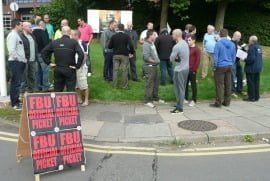On Wednesday 25th September, firefighters across the UK from the Fire Brigades Union (FBU) went on strike for four hours in protest against changes to firefighters’ pensions. Darrall Cozens of the Coventry TUC reports on the latest action by workers against attacks on the public sector.
“This is a shot across the bows”, said the FBU rep at the central fire station in Coventry located at the bottom of the Radford Road. “If the government does not return to serious negotiations, we will take further action to defend the public and our members. We have already planned a mass national demonstration in London on October 16th that will be well attended by London FBU members as they are being hit particularly hard. Despite massive public opposition to the cuts in London, which included a petition of more than 100,000 signatures, Boris Johnson believes he has the legal right to shut 12 fire stations in the capital, lose 27 fire tenders and 500 jobs.”
The action today is in defence of firefighters’ pensions, but the real issue is to defend the public and the safety of firefighters. The government’s plans are the same for all public sector workers: work longer, pay more into your pension and get less. For firefighters it is particularly hard. As the FBU leaflet says, “Fire fighting is a uniquely dangerous and physically demanding profession. These changes will compromise both firefighter and public safety”. Under the government’s plansfire fighters in their late 50s will be expected to fight fires and rescue families as they will have to work until they are 60. And if a fire fighter has to leave as he or she cannot do the job, they will lose one fifth of their pension if they go at 55.
In the past, older workers in all industries, including the fire service, could be moved to less strenuous admin tasks as they approach pensionable age. This is not longer the case. These “desk jobs” no longer exist. Admin support staff numbers have been cut to the bone as have fire prevention and fire safety functions. So there is no area of work within the service where the massive experience that long term serving firefighters have built up can be used. And the government’s own review could lead to “mass sackings of older firefighters on the grounds that they cannot meet the fitness standards required by the service to ensure they are physically capable of doing the job”. Furthermore, “the government’s own review says that over half of current 50-54 year old firefighters and two-thirds of 55-60 year old firefighters are below minimum recommended fitness levels for the job”.
At the moment firefighters pay some of the highest pension contributions in the UK’s public and private sectors – at an average of 13.2% of their wages – and have seen increases for two years on the trot. Many of the new entrants to the service are being priced out of the pension scheme. Last year over a quarter of full time firefighters recruited to the service chose not to join the scheme. That will have disastrous knock-on effects as staff retire and take their pension but fewer entrants join the scheme. Even worse, what will happen to those who enter the service now and who cannot afford to join the pension scheme? What will they do when to comes to their turn to retire?
Firefighters up and down the land are now in the forefront of taking industrial action to defend the public, the lives of firefighters and conditions of service. They are being made the latest scapegoats of austerity measures so that a system that praises the increasing wealth of a tiny minority and the increasing poverty of the vast majority can continue to exist.
This battle must be won and the winning of it will set the mark for other workers to follow. It will re-ignite the ranks of the labour movement to defeat the austerity measures, turf out this government and bring to political power a government that will use the wealth created by the labour of working class people to restore pensions, increase public spending, build homes and expand public services. Defence of the firefighters therefore also means fighting for a different kind of society – a socialist society.






